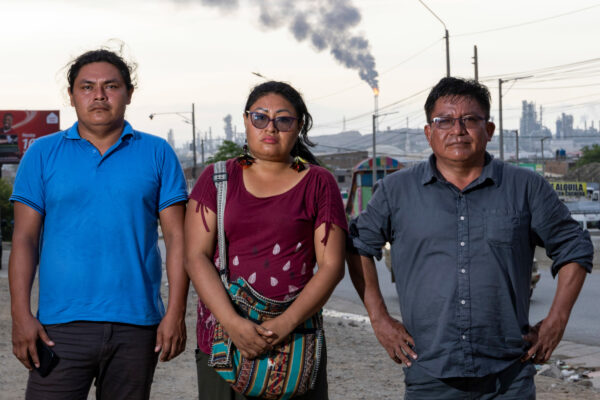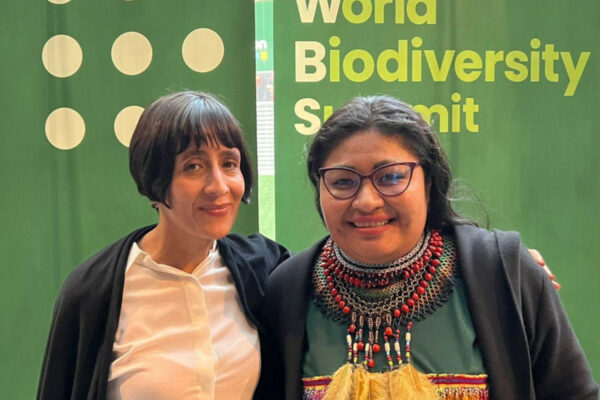Download Report: English Version (pdf)(400kb) Versión en Español (pdf)(398 kb)
The following report was presented recently to multi-lateral and bilateral financial institutions considering financing of Peru’s Camisea gas project. The report provides an independent assessment of the most significant potential environmental and social impacts of the Camisea natural gas field and pipeline project on the Urubamba River Valley. The independent evaluation process, which was coordinated by independent consultant Patricia Caffrey (former director of World Wildlife Fund-Bolivia), is based on extensive analysis of the upstream and downstream environmental impact studies and proposed mitigation plans. Its key findings include the following.
1. Irreversible Negative Impacts and Compliance:
The Project will have negative irreversible impacts on the biodiversity of this area and on indigenous groups living in isolation, regardless of the implementation of the strictest mitigation measures.
Neither the upstream nor the downstream component of the Project meets World Bank environmental guidelines and operational policies (including indigenous peoples policy and critical natural habitat policy). Exploration, extraction and transport activities will destroy primary tropical humid forests and will lead to degradation and conversion of critical natural habitats. Special analysis of impacts on indigenous groups – particularly indigenous groups living in voluntary isolation is deficient. Corresponding plans to prevent and mitigate negative impacts to these groups is lacking. Both companies are in violation of the ILO Convention 169.
Local stakeholders were not given appropriate information or sufficient time to study and respond to the environmental impact assessments. Current compensation negotiations and practices do not allow for free and informed decision-making on behalf of the indigenous groups. They have not been involved in decision-making over issues that will affect them.
2. Failure to Recognize Induced or Cumulative Impacts and to Control Access:
Analysis of indirect induced impacts and corresponding environmental management measures to address such impacts are deficient. Both components were studied separately so there is no recognition of the combined impacts of both upstream and downstream projects..
Improved access will lead to increasing colonization, deforestation, environmental degradation, health hazards, loss of cultural integrity and social conflict.
3. Community Relations and Participation:
Public involvement in the EIA reviews has been woefully inadequate.
The local stakeholders have not had any input into the Project design, environmental management plans or proposed compensation measures. Compensation negotiation practices have served to divide, confuse and weaken the Machiguenga community. The companies are negotiating exclusively on their terms.
Indigenous Peoples Living in Isolation:
The boundaries of the Reserva del Estado al Favor de las Poblaciones Nativas Nomade Kugapakori y Nahua have not been respected by allowing gas exploration and extraction in the Reserve. Three of the four platforms in block 88 and most of the seismic activity will take place in the Reserve (see map).
Even though the companies may discourage contact, it is extremely likely that during the 33 year period of implementation of the Project that contact will occur against the will of some of these groups.
Respecting the boundaries of the Reserve and the rights of the isolated peoples would entail prohibiting development of three of the platforms (Cashirairi 1 & 3, San Martin 3) and reducing seismic exploration so that it will not take place in the Reserve.
No independent oversight mechanism has been proposed to ensure adequate development of measures and strict compliance to company policies, codes of conduct and contingency plans related to indigenous peoples living in isolation
The review was commissioned by the Consejo Machiguenga del Río Urubamba (COMARU), the indigenous organization representing 29 communities in the Upper and Lower Urubamba River and the Asociación Interétnica de Desarrollo de la Selva Peruana (AIDESEP) with support from the cooperating organizations – Amazon Watch, Oxfam America and the Centro para el Desarrollo del Indígena Amazónico (CEDIA). The technical review was conducted by an independent group of experts who worked closely with the Grupo de Interes and the local stakeholders to research, analyze and finalize this report. The technical experts included independent consultants in addition to voluntary input from experts from the following organizations – Racimos de Ungurahui, AIDESEP, World Wildlife Fund Peru, COMARU, CEDIA, Oxfam America, Peru Verde, ELAW Peru, and Amazon Watch.
Patricia Caffrey can be contacted at caffreyNittler@msn.com













